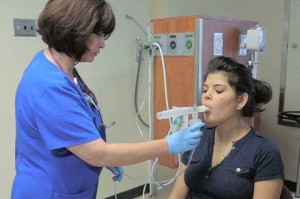Respiratory Therapist: Education and Career Information
If you are interested in healthcare and how the pulmonary system works, you may want to consider a career as a respiratory therapist. This is a hands-on position that requires long periods of standing and lifting, but is rewarding as a profession. This is a highly specialized field, but is consistently growing and can be lucrative when in the right setting.
What does a respiratory therapist do?
A respiratory therapist is someone that provides treatment for individuals with health related issues that affect the cardiopulmonary system. These issues can range from asthma to cardiovascular disorders. They provide care and life support to a diverse set of patients in intensive care units, the emergency room, pulmonary lab, general hospital, and other specialized areas like rehab. Respiratory therapists work with patients of all ages and are familiar with all the latest practices and equipment that will assist in diagnosing medical concerns and other breathing difficulties. They can be found in hospitals, physician offices, nursing homes and other entities. They also travel to patient homes, and are usually on their feet for an extended period of time.
They also interview and examine patients, monitor the progress of treatment, perform various tests, help physicians develop treatment plans, supervise respiratory therapy technicians and teach patients how to use treatments. They perform these duties in facilities and in homes through home visits. This requires them to be able to inspect and clean equipment, monitor medications and demonstrate to families how everything should be done. They work as counselors to make sure everyone is on the same page and can coordinate services, get assistance for the patient, and works to understand how the patient feels.
How much does a respiratory therapist earn?
A respiratory therapist earns about $55,870 per year on average. This salary is contingent based on location, experience, facility, education and specialty. The job outlook is promising, with a 19% average growth through 2022. On the low scale, respiratory therapists make about $40,000, with the high scale earning almost $80,000 or more.
What types of skills does a respiratory therapist need?
Critical Thinking: A respiratory therapist must be able to think critically and quickly in order to solve problems and recommend a plan of treatment.
Monitoring: Being able to monitor the performance of the patient before, during and after their treatment is essential. It is important to be able to note any changes or difference to take corrective action when needed.
Active Learning: Actively learning about patients, their conditions and solutions is key. Being assertive in learning all you can about the patient, the treatment and their physicians is important. Being perceptive enough to pick up on things can make a big difference in moving forward.
Judgment and Decision-Making: It is important to make sure decision-making skills are essential, as well as exercising good judgment when dealing with administrators and patients. Good judgment is also needed to recommend the right course of action for treatment.
Coordination: It is important to know how to coordinate services, appointments, and meetings with patients, families and other professionals.
Instruction: Being able to instruct patients and conduct workshops on how to breathe and other components needed is important in carrying out this role.
Time Management: Time management is an important aspect of this position, as there are a number of appointments to keep track of, meetings to attend, and other activities to complete. Being able to juggle everything when having such a hectic schedule is key.
Writing: Being able to write and keep track of the different treatments and patient records is important when dealing with patients and other professionals. It is important to know how to communicate clearly and succinctly, while writing legibly is an essential part of this role.
Negotiation: Negotiating with clients and other professionals to get things done in a professional manner is one of the main aspects of this role. Successfully negotiating levels of care with patients can make a tremendous difference in how the treatment is carried out.
Persuasion: Being able to persuade clients on treatment, or taking additional steps to get better is key. Knowing how to talk to and navigate professionals and administrators will take you far in being successful.
Patience: Respiratory therapists may have a number of clients per day with special needs that require long periods of attention.
Science and math skills: It is important to understand mathematical calculations, and the anatomy of the human body.
Internship requirements
There are clinical components required through internships that grant course credit, along with practical experience in learning how to treat patients.
Education Requirements
Respiratory therapists must have at a minimum, an associate’s degree, but most of them go on to complete a bachelor’s degree program. These programs include courses in human anatomy and physiology, chemistry, physics, microbiology, pharmacology, and mathematics. Other courses deal with therapeutic and diagnostic procedures and tests, equipment, patient assessment, and cardiopulmonary resuscitation (CPR).
Respiratory therapists must be licensed, and the requirements vary by state. Individuals must sit for an exam to obtain certification. Although not always required, it is essential in advancing in the career and is needed to obtain a state license.
The National Board for Respiratory Care (NBRC) is the main certifying body for respiratory therapists. The Board offers two levels of certification: the Certified Respiratory Therapist (CRT) and the Registered Respiratory Therapist (RRT).
The first level is the CRT. Everyone vying for the CRT must have earned an associate’s degree from an accredited respiratory therapy program, or completed the equivalent coursework in a bachelor’s degree program, and pass an exam.
The second-level certification is the RRT certification. Individuals must have a CRT certification, meet other education or experience requirements, and pass an exam.
Being a respiratory therapist can be a rewarding career that can provide a stable income for someone who is passionate about helping people and their quality of life.






